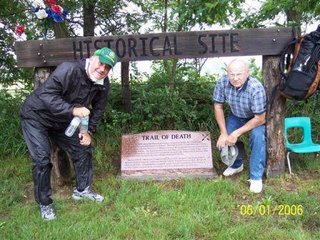
Day 41 Clinton, MO Mile 427
Oct. 14, 1838
The Indians had been promised in Quincy that they could take Sundays off for worship and Polke kept his promise and they stayed a second day in Clinton. Father Petit gathered his flock for an extended worship service—much more than the usual morning and evening prayers for the devoted.
On Sunday evening the political intrigue returned. General Morgan was gone so that was a lost cause now—he was gone. The next issue that arose related to Doctor Jerolaman. Chief Ash-Kum and I-o-weh were in agreement on this issue: get rid of Doctor Jerolaman. The journal says the two chiefs along with others came to “demand the dismissal or suspension of Dr. Jerolaman, the physician for the emigration whom they had ceased to like and did not wish him longer to accompany the emigration.”
What was behind this demand? Was it a common ground unity-demand that both Ash-Kum and I-o-weh could agree on. While they differed on Morgan they agreed wholeheartedly on Jerolaman—he must go. Why? What had the Doctor done that incurred their wrath? Was it his bedside manner where he despised the Indians and they caught his attitude? Was it his intermittent presence—especially in Indiana and Illinois when all their children were dying—i.e. “Where were you when our babies were dying—you were in your comfortable town and now you show up when most of them are gone?” Did they sense the fat paycheck he would collect at the end of this expedition—the equivalent of 908 acres of Indians land at the prices they were forced to sell—a tidy sum for two months work where all expenses are paid and you get a generous sick day policy that enables you to stay in comfortable towns when the Indians needed you most? What caused their insistence that the doctor be fired?
Whatever, they were not dealing with a military man but a judge. Judge Polke was not given to rash decisions and answered them informing them “that their request was one of so much importance and so unusual in emigration, that he hoped he might be allowed time not only to decide himself but to council with his officers.” This seemed to satisfy the Indians with the promise that a final answer would be given the next evening.
AS FOR ME my regimen for healing my silver-dollar-blisters was to walk less, rest more and air out my feet every hour. That strategy failed today. It rained all night—six inches nearby farmers said. And it was still raining in the morning when I took down my tent and packed up my now-damp sleeping bag. I thought of the Potawatomi folding their wool blankets chuckling that in the dampness wool is far better than modern down sleeping bags. I walked my five miles into Clinton/North Fork by noon in pouring rain and there I was met by Don and Liz Gander again—the son and daughter-in-law of Josephine Gander with whom I had stayed two night’s before. They had driver all the way from Monroe City to bring a Sub and soda for my lunch. Joining them in their pick-up truck I wolfed down the sandwich and chatted one final time before bidding this wonderful family goodbye. I carry in my pocket an arrowhead found by the late Josephene’s husband who was a farmer and “could see an arrowhead from 25 feet” while on a tractor. She had given it to me as I departed the day before. Now I bid farewell to her son and his wife, Liz. I even got a quick hug from Don, a retired Air Force office probably not given to hugs. I headed south toward Paris in the pouring rain secretly hoping I’d make it before dark and maybe even be able to get a motel room so I would not have to pitch my sopping wet tent this night. There was no hope of drying it—it was raining.

0 Comments:
Post a Comment
<< Home